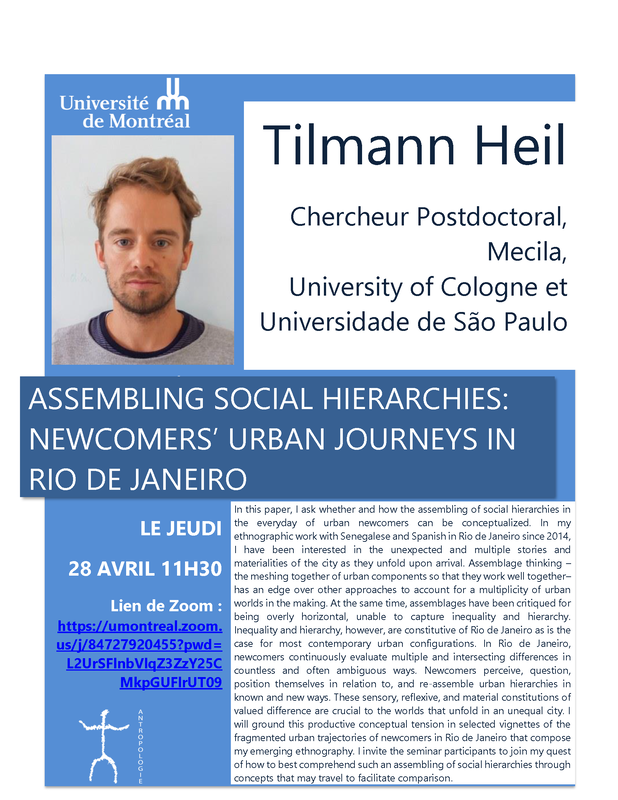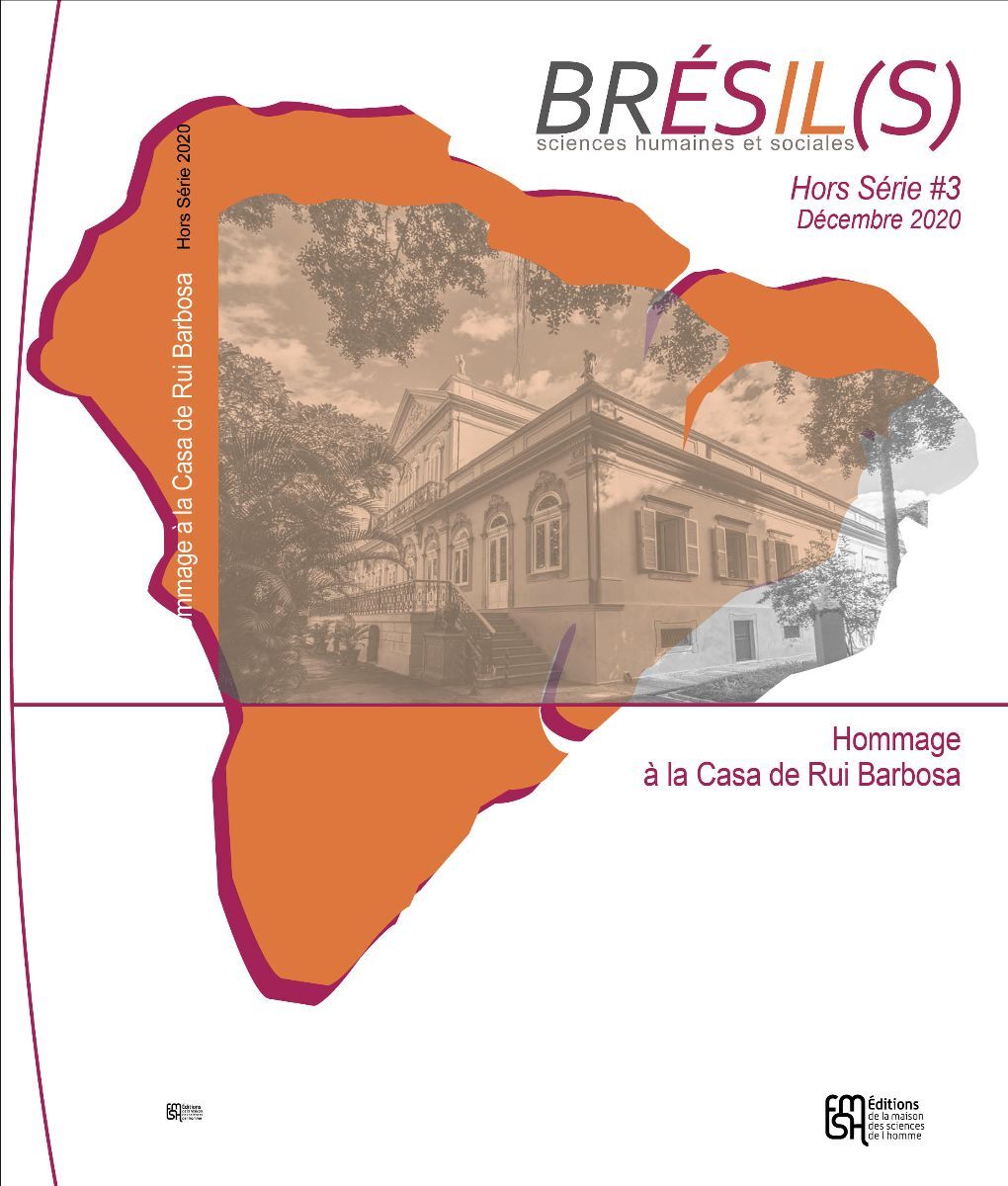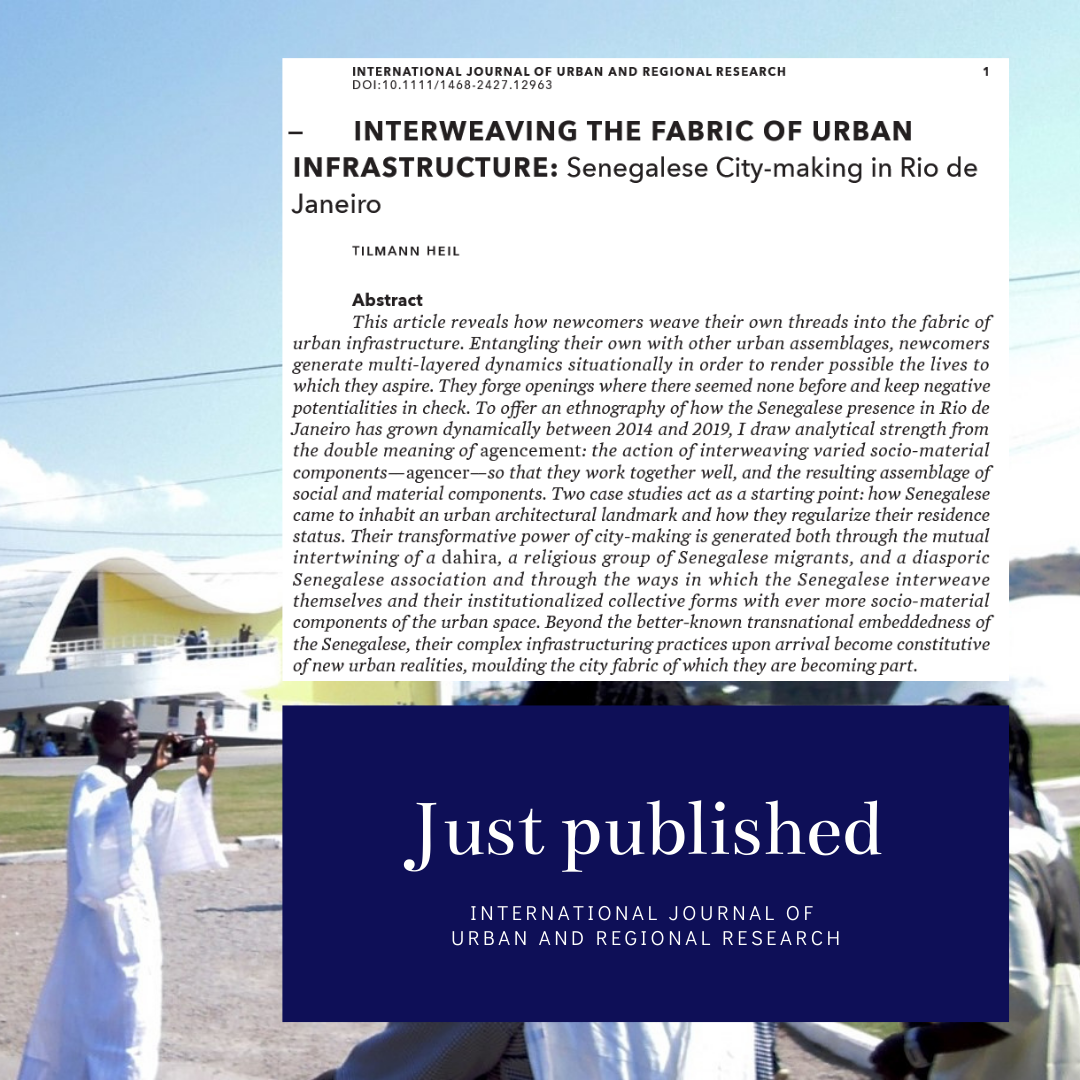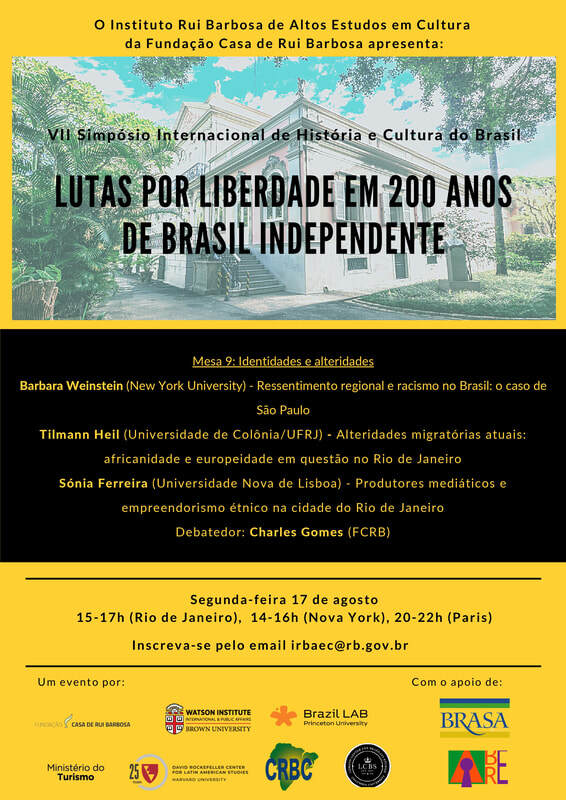- Published on
-
In this paper, I ask whether and how the assembling of social hierarchies in the everyday of urban newcomers can be conceptualised. In my ethnographic work with Senegalese and Spanish in Rio de Janeiro since 2014, I have been interested in the unexpected and multiple stories and materialities of the city as they unfold upon arrival. Assemblage thinking – the meshing together of urban components so that they work well together– has an edge over other approaches to account for a multiplicity of urban worlds in the making. At the same time, assemblages have been critiqued for being overly horizontal, unable to capture inequality and hierarchy. Inequality and hierarchy, however, are constitutive of Rio de Janeiro as is the case for most contemporary urban configurations. In Rio de Janeiro, newcomers continuously evaluate multiple and intersecting differences in countless and often ambiguous ways. Newcomers perceive, question, position themselves in relation to, and re-assemble urban hierarchies in known and new ways. These sensory, reflexive, and material constitutions of valued difference are crucial to the worlds that unfold in an unequal city. I will ground this productive conceptual tension in selected vignettes of the fragmented urban trajectories of newcomers in Rio de Janeiro that compose my emerging ethnography. I invite the seminar participants to joining my quest of how to best comprehend such an assembling of social hierarchies through concepts that may travel to facilitate comparison.
-
- Published on
I am glad to organize this interdisciplinary panel with Clara Ruvituso, Ramiro Segura and Astrid Ulloa from Mecila! Consider submitting your work:
Interdisciplinary Panel
07.09 Latin America under the Conviviality-Inequality lens: Current scenarios and possible futures of living together
at the
Congreso Internacional del Consejo Europeo de Investigaciones Sociales de América Latina (CEISAL)
13-15 June 2022 in Helskinki, Finland
Abstract
This panel invites contributions that discuss the current scenarios and possible futures in Latin America under the lens of Conviviality-Inequality. In the last years, Conviviality-Inequality studies developed a focus on Latin America, initiating productive dialogue with Latin American social thought, otherwise often displaced to the margins of global knowledge circulation, where it dwells together with postcolonial studies, the critiques of anthropocentrism, and further critical theories of the other "souths" and "norths". The panel aims to go beyond established conceptions of coloniality and modernity, globality and locality, or parallel notions that present all too simple binaries, juxtapositions, and closures.
Multiple and intersecting social, political, and material regimes have shaped Latin American territorialities. They have emerged from the confluence and entanglement of colonial and imperialist, as well as modern and developmentalist globalizing forces and their contestations. These regimes shape time-spaces of different scales, from the global to the local, from the event to long durée. The paired concept Conviviality-Inequality captures the co-existence of ever-changing configurations of these multiple processes and their spatializations. While conviviality theoretically encompasses the spectrum from conflict to peace, its conceptual marriage to inequality hones in on the hierarchical, unequal historical condition, in Latin America and beyond. Current debates of zumbification, aquilombar, buen vivir, and ways of rethinking creolization, mestizaje, négritude, imperialism, and ancestral knowledge explore the convivial configurations of the Latin American pasts, presents, and futures. They take the interdependent inequalities and differences into account (among others, race, ethnicity, gender, religion, citizenship, human/more-than-human) as
well as the countless forms of resistance and contestation that have arisen in the region. Attention to such configurations brings onto-epistemological openings to the forefront: spatialities, temporalities, colonialities, and modernities are all constituted in the plural.
Within the rapidly changing global scenario of both global social movements, such as “Vidas negras importam”, “Estallido social”, “Fridays for Future”, and the Covid-19 pandemic, Conviviality-Inequality opens a novel and productive opportunity for analysis given its focus on specific tensions at local and global levels, between inequality and differences, and their contestations. Papers should empirically explore concrete examples of Conviviality-Inequality, making use of the full spectrum of onto-epistemological, material, and symbolic plurality. Beyond the debates addressed so far, some such examples: the re-emergence of State power from urban centers to national borders, from the intimate community to the geopolitical scale; the salience of less-regarded categories of difference, such as age, dis/ability, or legal status in interaction that unfold in the configuration of race, class, and gender; the reconfiguring and diverse contestations in relation to the body, nature, or the non-human; the tensions, inequalities, and opportunities of the digital transformation and social media in knowledge circulation. Based on empirical reflections of the current conjuncture, we would like to discuss what kinds of convivial scenarios and futures become possible and conceivable in Latin America when the pluralities, synergies, tensions, interconnections, and contradictions are fully explored to address both continuities and change.
Practical Information
- Submissions via: https://www2.helsinki.fi/en/conferences/ceisal-2022/call-for-papers-open-from-sept-15-to-nov-30-2021
- Deadline 30 November 2021
- Abstract Length 300 words
-
- Published on
A strategic forum for Brazilianists
Result of the VII International Symposium on the history and culture of Brazil "Struggles for freedom in 200 years of an independent Brazil" (Simpósio Internacional de História e Cultura do Brasil: Lutas por liberdade em 200 anos de Brasil independente) has resulted this beautiful open access publications from across the humanities and social sciences.
It reminds us of how important it is to maintain freedom and the creativity of thought to actively engage with the politics and poetics of a complex world such as that which is unfolding in the time-space that is today commonly named "Brasil".
I have contributed with a reflection on aspects of Otherness that derives from current migrations to Brazil. Enjoy the read!TABLE OF CONTENT OF THE ISSUE OF BRÉSIL(S):
https://doi.org/10.4000/bresils.8557- Antonio Herculano Lopes, James N. Green et Mônica Raisa Schpun
Casa de Rui Barbosa : forum stratégique de dialogue entre brésilianistes [Texte intégral | fr]
Casa de Rui Barbosa: foro estratégico de diálogo entre brasilianistas [Texte intégral | traduction | pt]
Casa de Rui Barbosa: Strategic Forum for a Dialogue among Brazilianists [Texte intégral | traduction | en] - Antonio Herculano Lopes
O teatro de Machado ou o Ocidente em mim [Texte intégral]
Le théâtre de Machado de Assis et l’Occident en moi
The Theater of Machado de Assis or the West within Me - Sidney Chalhoub
Visões do amor num conto machadiano [Texte intégral]
Visions de l’amour dans une nouvelle de Machado de Assis
Visions of love in a short story by Machado de Assis - Šárka Grauová
Lima Barreto e a poética do nome [Texte intégral]
Lima Barreto et la poétique du nom
Lima Barreto and the Poetics of the Name - Isadora Mota
Sempre em luta pela liberdade: notas sobre a alfabetização geopolítica dos negros brasileiros [Texte intégral]
Toujours en lutte pour la liberté : notes sur l’alphabétisation géopolitique des esclaves brésiliens
Always Struggling for Freedom: Notes on the Geopolitical literacy of Enslaved Brazilians - Mariana Simoni
Poéticas e políticas do ver na literatura brasileira [Texte intégral]
Poétiques et politiques de la vision dans la littérature brésilienne
Poetics and Politics of Vision in Brazilian Literature - Eduardo Jorge de Oliveira
Literaturas pós-etnográficas: uma leitura de A queda do céu [Texte intégral]
Littératures post-ethnographiques : une lecture de La Chute du Ciel
Post-Ethnographic Literatures: reading The Falling Sky - Regina Horta Duarte
Aliança e submissão, extinções e resiliências: caminhos entrecruzados da sociedade brasileira e animais [Texte intégral]
Alliance et soumission, extinctions et résilience : chemins entrelacés de la société brésilienne et des animaux
Alliance and Submission, Extinctions and Resiliences: Intertwined Paths of Brazilian Society and Animals - Tilmann Heil
Alteridades migratórias atuais: africanidade e europeidade em questão no Rio de Janeiro [Texte intégral]
L’altérité migratoire aujourd'hui : africanité et européanité en question
Current Migratory Otherness: Questioning Africanness and Europeanness in Rio de Janeiro - James N. Green
Lesbian Voices and Radical Feminism within the Brazilian « Homosexual Movement » of the 1970s and Early 1980s [Texte intégral]
Voix lesbiennes et féminisme radical au sein du « mouvement homosexuel » brésilien des années 1970 et du début des années 1980
Vozes lésbicas e feminismo radical dentro do « movimento homossexual » brasileiro dos anos 1970 e início dos anos 1980
-
- Published on
It's a long journey that comes to an end as an #openaccess article in IJURR (doi.org/10.1111/1468-2427.12963).
I was fascinated how newcomers make the city according to their tastes, needs, visions, and projects weaving threads together that have not been connected before. I focus on the action of interweaving - or agencer - in which they connect themselves and their collective forms of organization to religious, social, political and material elements of urban space. First and foremost, I thank my interlocutors with whom I learned about the multiple Rios that emerge from complex lives lived in the multiple tensions in place.
The article sheds light onto the process of arrival that is at the basis of my project Valued Difference that I have developed over the last years in Rio de Janeiro, on which you can read here. -
- Published on
I will be presenting at the 9th roundtable on "Identities and Alterities" of this international symposium that honors the struggles for freedom in 200 years of an independent Brazil. I will discuss some of the current alterities in Brazli that arise from the recent arrival of West Africans and Southern Europeans in the city of Rio de Janeiro. I will discuss notions of Africanness and Europeanness in my interlocutors' narratives and experiences in Rio de Janeiro and how this discussion facilitates an understanding of some of the complexities of historically grown, currently active social hierarchies and racism in the city.Missed it? Please go and listen to our debate here! -
- Published on
in International Journal of Urban and Regional Research (IJURR)
Early View, pdf
Abstract
This article reveals how newcomers weave their own threads into the fabric of urban infrastructure. Entangling their own with other urban assemblages, newcomers generate multi‐layered dynamics situationally in order to render possible the lives to which they aspire. They forge openings where there seemed none before and keep negative potentialities in check. To offer an ethnography of how the Senegalese presence in Rio de Janeiro has grown dynamically between 2014 and 2019, I draw analytical strength from the double meaning of agencement: the action of interweaving varied socio‐material components--agencer--so that they work together well, and the resulting assemblage of social and material components. Two case studies act as a starting point: how Senegalese came to inhabit an urban architectural landmark and how they regularize their residence status. Their transformative power of city‐making is generated both through the mutual intertwining of a dahira, a religious group of Senegalese migrants, and a diasporic Senegalese association and through the ways in which the Senegalese interweave themselves and their institutionalized collective forms with ever more socio‐material components of the urban space. Beyond the better‐known transnational embeddedness of the Senegalese, their complex infrastructuring practices upon arrival become constitutive of new urban realities, moulding the city fabric of which they are becoming part.



